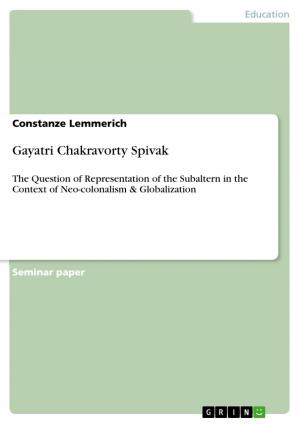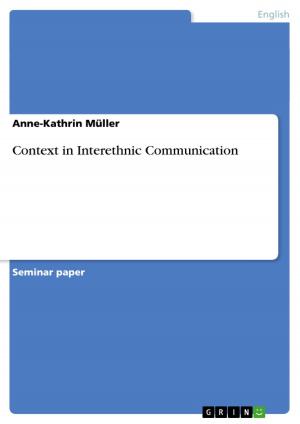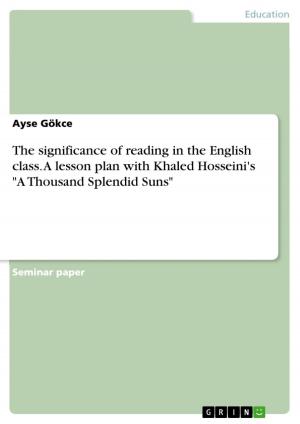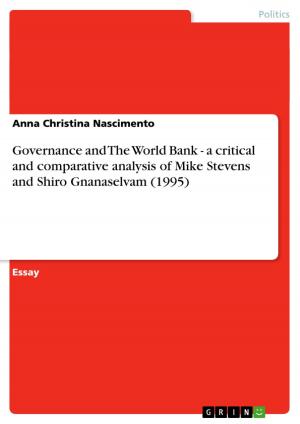Prerequisites of return and reintegration for long term internally displaced persons in Northern Uganda
Nonfiction, Social & Cultural Studies, Political Science, International, International Security| Author: | Etienne Salborn | ISBN: | 9783640782895 |
| Publisher: | GRIN Publishing | Publication: | December 22, 2010 |
| Imprint: | GRIN Publishing | Language: | English |
| Author: | Etienne Salborn |
| ISBN: | 9783640782895 |
| Publisher: | GRIN Publishing |
| Publication: | December 22, 2010 |
| Imprint: | GRIN Publishing |
| Language: | English |
Bachelor Thesis from the year 2010 in the subject Politics - International Politics - Topic: Peace and Conflict Studies, Security, grade: 2,0, Management Center Innsbruck, course: Non-profit Management, Peace Studies, language: English, abstract: Relative peace since 2006, after 20 years of armed conflict in Northern Uganda, brings the possibility for the internal displaced persons (IDPs) to leave displacement camps and return to the area of their original residence. Through a standardized survey of 178 individuals from the Gulu district in Northern Uganda, this study examines the needs and prerequisites of return and reintegration. Lasting peace is the uttermost condition for any other prerequisite of this study. IDPs need the voluntary wish to return, which 75% did indicate since they are longing for their ancestral land to engage in agriculture and want to leave behind the harsh and unfavourable conditions of the IDP camps. The population of the Gulu district has been highly traumatized by the lasting armed conflict, making counselling and psychological treatment of trauma necessary. 1/3 is suffering from nightmares and ¼ fears evil spirits from murdered members of their communities. Over 2/3 of IDPs believe that justice was not achieved. Voluntary movement has to be guaranteed, as the returnees who felt forced to return show significantly high movement between the return area and the old IDP camp and lower ability for reintegration. Although, 90% of the once 1.8 million IDPs have returned, only 50% have been able to fully reintegrate back into a life of social, economic and cultural balance. The majority from the remaining IDPs are unable to return out of their own strength. 9% percent has lost hope to be able to return, since they cannot find assistance or do not have land to return to. 46% are extremely vulnerable, needing special assistance and tailored interventions, as they lack the financial and human capacity to return. 1/5 of the IDPs do not know the boundaries of their land, and 1/3 are having ongoing land disputes. 42% claim to have no monetary income whatsoever and 16% are unable to supply themselves sufficiently with food. Infrastructure and services need to be re-established, as the lack of shelter, schools, health centres and water sources are the main facilities the IDPs need in their return areas.
Bachelor Thesis from the year 2010 in the subject Politics - International Politics - Topic: Peace and Conflict Studies, Security, grade: 2,0, Management Center Innsbruck, course: Non-profit Management, Peace Studies, language: English, abstract: Relative peace since 2006, after 20 years of armed conflict in Northern Uganda, brings the possibility for the internal displaced persons (IDPs) to leave displacement camps and return to the area of their original residence. Through a standardized survey of 178 individuals from the Gulu district in Northern Uganda, this study examines the needs and prerequisites of return and reintegration. Lasting peace is the uttermost condition for any other prerequisite of this study. IDPs need the voluntary wish to return, which 75% did indicate since they are longing for their ancestral land to engage in agriculture and want to leave behind the harsh and unfavourable conditions of the IDP camps. The population of the Gulu district has been highly traumatized by the lasting armed conflict, making counselling and psychological treatment of trauma necessary. 1/3 is suffering from nightmares and ¼ fears evil spirits from murdered members of their communities. Over 2/3 of IDPs believe that justice was not achieved. Voluntary movement has to be guaranteed, as the returnees who felt forced to return show significantly high movement between the return area and the old IDP camp and lower ability for reintegration. Although, 90% of the once 1.8 million IDPs have returned, only 50% have been able to fully reintegrate back into a life of social, economic and cultural balance. The majority from the remaining IDPs are unable to return out of their own strength. 9% percent has lost hope to be able to return, since they cannot find assistance or do not have land to return to. 46% are extremely vulnerable, needing special assistance and tailored interventions, as they lack the financial and human capacity to return. 1/5 of the IDPs do not know the boundaries of their land, and 1/3 are having ongoing land disputes. 42% claim to have no monetary income whatsoever and 16% are unable to supply themselves sufficiently with food. Infrastructure and services need to be re-established, as the lack of shelter, schools, health centres and water sources are the main facilities the IDPs need in their return areas.















